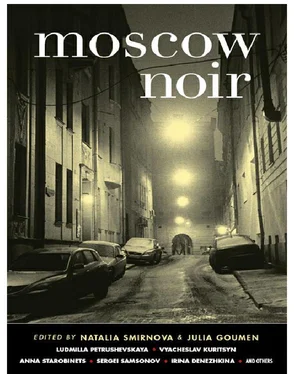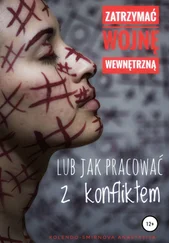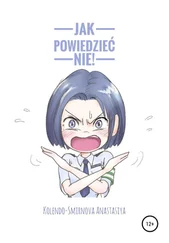“Did you tell me the truth?”
“Yeah, honest. In the beginning I didn’t know what was going on. I just wanted to make a little dough. But then, after that first time, I couldn’t refuse. They’d get me too.”
“All right, you can live. Call him.”
“Who?”
“The killer, Artyom.”
When the door opened, Artyom got a blow on the head with the handle of a gun. As he was collapsing, Maxim saw that it was Nikita.
What a fucking world, Maxim thought. What a goddamn fucking world.
He even spat on the floor. Rather, he spat on Nikita’s stained jacket, which was his uniform.
“All right, holy man, start talking,” said Maxim when Nikita came to.
Nikita was quiet.
“Do you realize you’re not getting out of here alive, you Judas?”
Nikita nodded.
“Did you kill Arkady?”
Nikita nodded his head again, staring at the floor.
“Talk.”
“I had to.”
“What, does your five-year-old daughter have leukemia?” asked Maxim, recalling the thirty-year-old whose neck he’d broken, snapped just like a chicken’s.
“No, I owe big money. They took my wife. Gave me three months to pay.”
“How much?”
“Five hundred grand.”
“Holy shit!” Maxim roared. “What are you doing? I have the money. I have a million! I could have—”
“How was I supposed to know that? It’s like everybody just kind of up and left. Life fuckin’ pulled us apart in all different directions.”
“Okay. I give you my word that I’ll get your wife out of there. Now talk.”
So Nikita started talking again. He told Maxim how the program manager had decided to play under the table. Of course, he kept that secret from the organizers, who paid the prize money. Player number four was supposed to get ten million. No risks on his part, because the manager had put together an unofficial team. That was where Nikita was working. The unofficial team had two functions: guarding number four, and not letting opponents get near him. Also, they got rid of “extra” players using any means possible, including what they had tried on Maxim. The payoff for the mongrel team was supposed to come from the prize money that number four would receive. Nikita agreed. How much the others were getting he didn’t know; naturally, the manager would be taking the largest cut.
When Nikita finished, Maxim handed him a gun with one shot in it.
“Don’t worry about your wife, I’ll get her out. But don’t try any funny stuff, cause you know my response time was always better than yours. Do I make myself clear?”
Nikita nodded and moved into the far room.
Time slowed down to almost a standstill. It got as thick as ketchup that doesn’t want to come out of the bottle in the freezing cold.
Outside, a baby started crying.
Water rumbled in the pipes.
Then it got quiet.
Then a shot rang out.
“That’s it,” said Maxim. “Get dressed.”
The transvestite, chalk-white with fear, started.
“No!”
“Idiot. You’re going with me. You’ll be a witness.”
“Why?!”
“You’re not on trial, darling. But I have to explain to the investors why I crushed all those snakes and cut the manager’s balls off before I killed him.”
Maxim crossed the streetcar tracks and jumped the low barrier dividing the fetid boulevard from the street stinking of exhaust fumes. He strode toward the house with columns, digging the heels of his massive lace-up boots into the road. The manager had twenty minutes left to live. His moronic bodyguards, with earphone wires sticking out from underneath their jacket collars, had even less time.
The transvestite hurried along, sticking close by, in a tight English skirt, his face crumpled in fear. From an outsider’s perspective, it might have looked like a stately middle-aged man walking an exotic, purebred dog.
A bum sitting on a park bench took a sip from the bottle of extra strong Ohota he had just found—miraculously, almost full. What a wonderful evening, he thought to himself.
DECAMERON
by Igor Zotov
Silver Pine Forest
Translated by Marian Schwartz
Facewise, Ryabets resembles a skull: gaunt, with a deep-set, chalk-white gaze and lips slightly parted—a permanent grin of large yellowed teeth. At school they called him Skull behind his back but didn’t dare to his face, so they gave him a nickname from his last name: Ryaba.
Now that he’s on the wrong side of fifty, the skull resemblance applies to his whole frame: shriveled and bony.
At breakfast Ryabets is reading the Moskovskii Komsomolets police blotter. While he’s tapping around the butt end of his egg with a spoon, while he’s peeling off the shell, he skims through the second-grade girl lost in the taiga outside Krasnoyarsk—takes a bite of buttered bread and chews—the drunk officer who shot a soldier—takes a sip of ersatz coffee—the…
Under “Private Prison with Torture Chamber in Silver Pine Forest,” it says that the cops picked up a naked vagrant wearing handcuffs, right there on the street in broad daylight, with a cracked skull and evidence of beatings to his body. The vagrant called himself Andryukha and managed to say he’d been tortured in a cellar with “electricity and tongs.” He whispered the address, 43 Second Line, then fell silent. They didn’t get Andryukha to No. 67 Hospital in time. He died in a traffic jam without regaining consciousness. The cops went to the address but the jailers were gone and the trail was cold. But the prison was remarkable: three cells with a stun gun, tongs, a rack, a Spanish boot, and all kinds of other things. The two corpses were also Silver Pine Forest vagrants. An investigation is under way .
Ryabets sets the newspaper aside and looks out the window. July. Hazy, hot, and stuffy. When he’s finished with breakfast, he puts his Marlboros, towel, swimsuit, three big sausage sandwiches (carefully wrapped in that same newspaper so they wouldn’t go bad), a bottle of water, a bottle of 777 port, and a plastic cup into a paper bag.
He tucks his short-sleeved shirt into his pants and slips on his sandals. Two trolley stops to Kaluzhskaya and then the subway to Kitai-Gorod. The route remembers itself, even though the last time he took it was back in the early 1970s, when Kitai-Gorod was called Nogin Square. Transfer to the purple line to Polezhaevskaya. He’ll ask from there.
Not much out the trolley window has changed in all those years: dust, buildings, poplar trees. Here’s the arched bridge and to the left another bridge—red cables, looks new. Beyond that the river and the Krylatskie Hills. The trolley dives down a slope and stops at a square. Ryabets gets out.
A few streets fanning away, fences, and behind the fences pines and high dacha roofs. Ryabets glances around—should be here somewhere. There used to be a beer stand here, but not anymore. They’d gone from the beer stand to the dacha last time. Not him. His feelings were hurt so he went home. Bolt took his book away from him. A word clicked in his memory: Decameron . Oh yeah—a stinging sleet slashing at the burn site, his heel making little holes in the black muck—the cover was charred, with dark blue, intricate twisting letters, Bolt’s book… He came here in the fall, before the army. How could he not? No, later.
It’s too hot for port… He then bought beer at a stand and took a sharp left turn into the woods.
Ryabets sleeps briefly. Right here under this willow. The beer-sun has taken it out of him. More like dozing, with quick dreams involving water splashing, children squealing, and a female mocking whisper directly above him. He opens his eyes but no one’s there and it’s quiet. Close them and all over again—a squeal, a splash, a whisper. And a rustling—are they stealing his bag? No one, a total haze. He sits up, gazing blearily at the river and at the white church on the opposite bank, cockeyed.
Читать дальше












